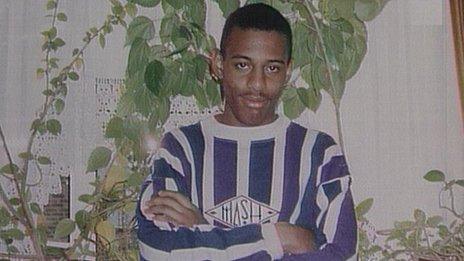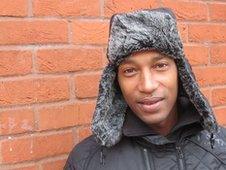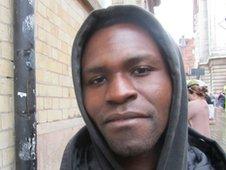Has racism been stamped out in the Metropolitan police?
- Published

After two men were found guilty of murdering the black teenager Stephen Lawrence, Newsbeat looks into young people's views of the police.
Eighteen-year-old Stephen Lawrence was stabbed in a racist attack in south-east London in 1993.
After his death, a report accused London's Metropolitan Police of "institutional racism" and incompetence in the way they handled the case.
It led to major changes in British policing, including:
Officers being told to keep records of everyone who they stopped and searched
Forces being urged to take on more staff from ethnic minority backgrounds
Officers being given more training about racism
Changes made to how racist crimes and complaints are dealt with
Newsbeat has been to Nottingham to find out if young black people still think they're unfairly treated by police.
'Feel labelled'
Raymond Campbell is a similar age to Stephen Lawrence and used to live near to where he was murdered in south London.
The 33-year-old now lives in Nottingham where his dad runs a youth club.

Raymond has been stopped by police and used to live in south-east London
He says he is used to being stopped by police: "When they try and check me I just say, 'Am I under arrest?' and they can't pursue what they want to do. I'm street wise so I know how to handle it.
"I do mind it because it takes your dignity away and makes you feel labelled. I'm trying to be an honest living person but it puts you down when they label you.
"I don't pull the race card because that doesn't get you anywhere."
The government is currently reviewing its stop and search policy, after the summer riots.
Three years ago a group of MPs said police had made 'tremendous strides' towards stamping out racism.
But there were still worries about the use of stop and search, with black people seven times more likely to be stopped, as well as the low number of people from ethnic minorities joining the police.
'There's a border'
Moses Opoku is 27 and says he's stopped talking to his cousin who became a police officer.
"That's how bad it is. Once you cross the line you become one of them. There's a border - them and us."

Moses Opoku is unhappy his cousin joined the police
'Dread' is 20 and admits to a criminal record, but still claims he's picked on by officers.
"We'll be stopping and talking, and say if a police officer was to come - bam! They'll pull over and have us in the back of the van.
"They just love to stop us. Now I don't even stop for them. I look at them, smile and walk off."
Dread's mate 'Blayton' is 21. He's white and says it's not just about race.
"They discriminate because of how we dress," he said. "Never judge a book by its cover. I could just walk at night and they stop you for random checks. It's not on."
Nottinghamshire Police says that while stop and search is an "important and lawful tactic with the power to keep young people safe", it knows that it is "sometimes an issue for some members of our communities".
The force added: "Any young person stopped under this regulation will be clearly explained their rights, the grounds under which we use Stop and Search and why we use it."
And on recruiting it said: "Nottinghamshire Police is determined to be representative of the communities it protects and has clear recruitment processes designed to attract applicants from across all unrepresented groups."